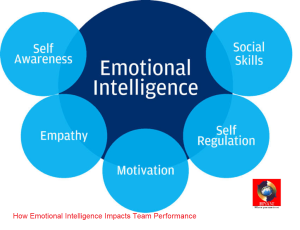Introduction
To enhance team performance and foster a space where collaboration and understanding flourish, emotional intelligence plays a crucial role. Teams that focus on emotional intelligence often navigate conflicts more smoothly, communicate with greater clarity, and forge strong bonds among their members. People who possess a high level of emotional awareness can identify their own emotions as well as those of their teammates, paving the way for more empathetic exchanges and helpful feedback. This increased sensitivity empowers teams to address challenges head-on and cultivate a friendly environment where everyone feels appreciated and respected.
When faced with challenging situations, teams that possess emotional intelligence truly stand out. They leverage their collective strengths, enabling them to adjust and devise innovative solutions. By recognizing the importance of emotional intelligence in team dynamics, organizations can foster a culture that enhances performance while also supporting member satisfaction and personal growth.
- Be aware of your own emotions
- Understand what others are feeling
- Practice empathy and navigate relationships thoughtfully
“Emotional intelligence is really about understanding your own emotions and being aware of how others feel too. It’s crucial for managing stress, improving communication, resolving conflicts, and fostering deeper connections—key elements for successful teamwork. That’s why many management courses now emphasize emotional intelligence as a core skill. Studies have found a strong connection between emotional intelligence and team success. Teams that are high in emotional intelligence tend to outshine their counterparts when it comes to performance, creativity, and productivity.”

Components of Emotional Intelligence:
- Self-awareness
- Self-regulation
- Understanding social dynamics
- Managing relationships
A successful team thrives on respectful, empathetic, and clear communication. Skills like active listening, providing thoughtful feedback, managing tone and body language, and asking insightful questions are where those with high emotional intelligence truly excel.
Better Conflict Resolution:Conflicts are inevitable in any team setting, regardless of how smoothly things are running. Tensions can stem from differing goals, work styles, or viewpoints. What truly counts is how these conflicts are addressed and resolved.
- Stay calm under pressure
- Separate the issue from the person
- Strive to understand viewpoints of others with a focus to find collaborative solutions
Increased Psychological Safety and Trust
Trust is that invisible glue that binds teams together. When team members feel secure, they’re more inclined to ask questions, take risks, share their ideas, and admit their mistakes without the fear of being judged. Those who possess emotional intelligence play a key role in nurturing this trust. Many Fortune 500 companies are now incorporating emotional intelligence training into their leadership development programs. Research indicates that teams with higher emotional intelligence often outperform their peers. By enhancing communication, creating a sense of belonging, building trust, and encouraging team cohesion, emotional intelligence greatly enriches the team culture.
Essential Skills of Emotional Intelligence:
- Self-awareness: Being in touch with your own emotions, values, strengths, and weaknesses, and recognizing how they influence those around you.
- Self-Management: Handling stress and having the ability to regulate your emotions, thoughts, and actions in various situations.
- Social Awareness: Noticing and understanding the feelings, viewpoints, and social signals of others.
- Relationship Management: Creating and nurturing healthy relationships, communicating effectively, and working well with others.
Conclusion
Emotional intelligence is truly a game-changer for leaders who want to boost their effectiveness. It revolves around how well you handle your interactions with others, which is crucial for building empathy, nurturing strong team dynamics, and ensuring successful collaboration. Leaders with high emotional intelligence are often more self-aware, enabling them to recognize emotional responses and stressors in both themselves and their team members.This awareness allows them to foster a supportive environment where everyone can flourish. Engaging in practices like journaling or self-reflection can help individuals delve into their emotional reactions in various situations. By pinpointing their emotional triggers, team members can craft strategies to better manage their feelings. Utilizing emotional intelligence to enhance teamwork is a powerful strategy for organizations looking to boost productivity and achieve lasting success. When companies recognize, nurture, and implement emotional intelligence within their teams, they can create a positive and collaborative workplace where individuals thrive and teams reach their full potential. Institutions like Biyani Girls College emphasize the importance of emotional intelligence as part of their holistic approach to leadership and management education, preparing students to become empathetic and effective leaders in the modern workplace.
Tags: Emotional Intelligence, Team, Conflict, Empathy, Self-Awareness
Blog By:-
Ms. Giti Vatsa
Assistant Professor, Dept of Commerce
Biyani Girls College

